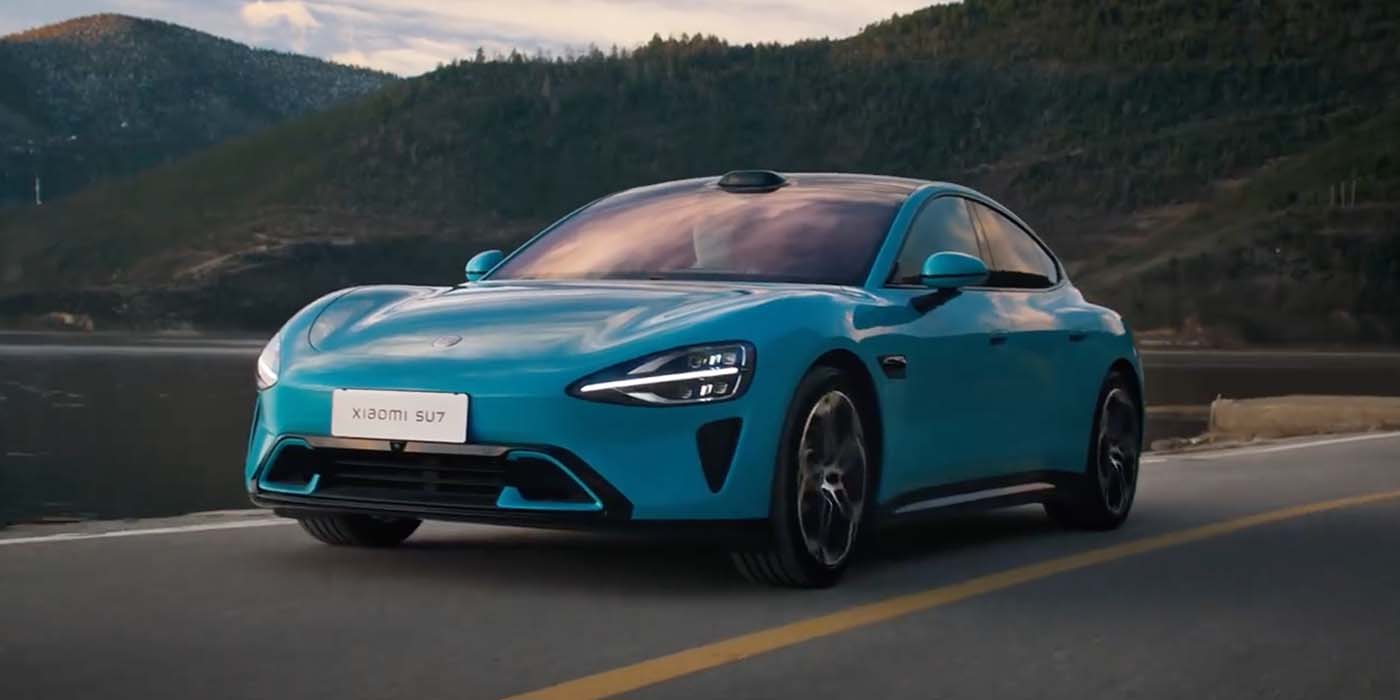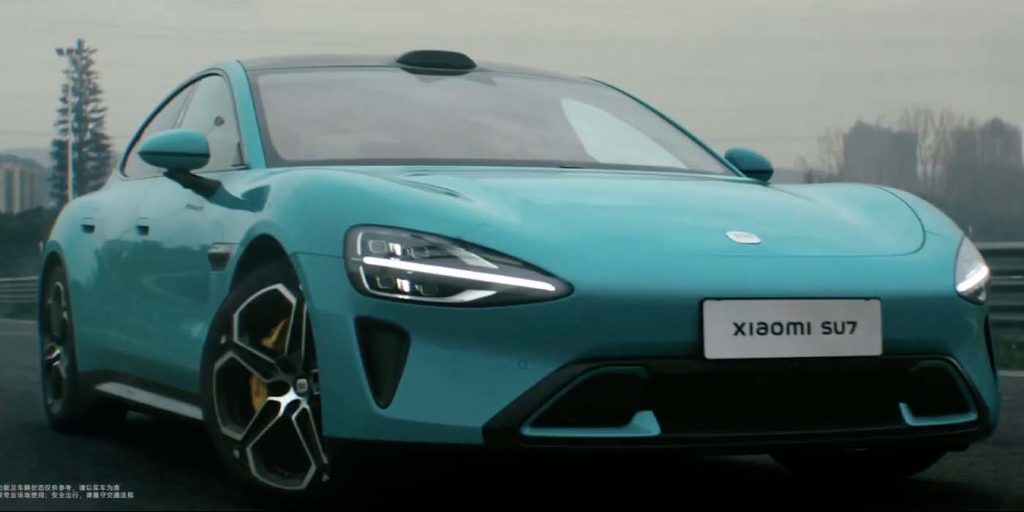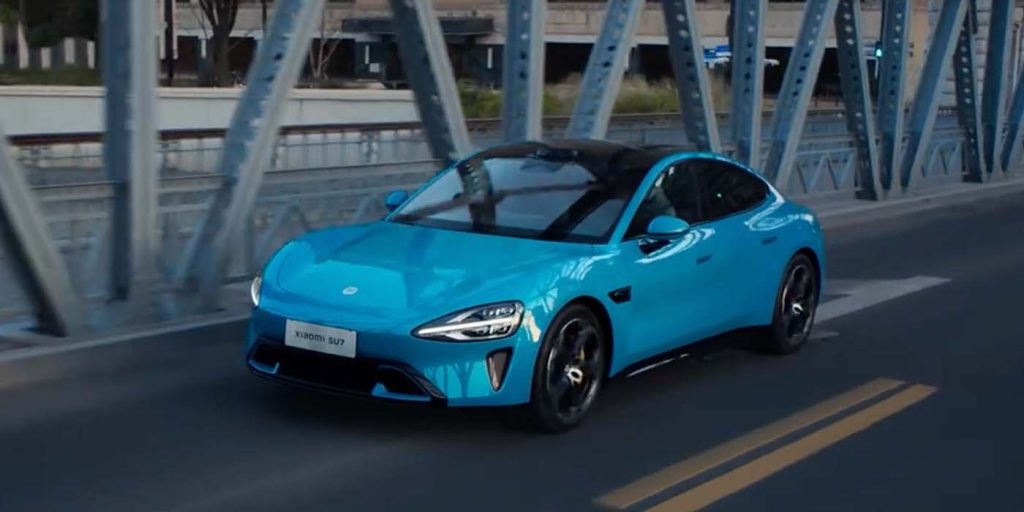
Apple may have bailed on its plans to build its own EV, but a Chinese competitor has completed the feat, and on paper, it has the makings to be one helluva first entry into the segment. Today, Xiaomi officially launched its first-ever EV, the SU7 – decked out with advanced battery tech, lightning-fast charging, and a mouth-watering range – all for starting MSRPs that will turn some heads. Oh, the smartphone manufacturer released a new phone model to match the new EV as well.
Although Xiaomi is making its case as a true competitor out of the gate in EVs, it has long been established as a trusted brand in China, manufacturing electronics based on an Internet of Things (IoT) platform, including smartphones, apps, laptops, home appliances, and scooters.
After seeing a decline in consumer electronics sales in the last decade, Xiaomi started turning its sights elsewhere, brainstorming how it could adapt its tech-savvy manufacturing expertise toward new lucrative ventures. It landed on EVs – a booming yet saturated market in China.
By 2021, Xiaomi Automobile was incorporated in China, and in two short years, the company was boasting faster-than-expected progress. By November 2023, we caught our first glimpse of Xiaomi’s first EV model – the SU7. A month later, the electronics company had officially unveiled the SU7 as a challenger to Porsche and who else but Tesla.
In February, Xiaomi shared plans to launch the new SU7 EV in Q2 of this year with hopes of capitalizing on its existing army of 20 million smartphone users. Today, the EV has publicly emerged to much acclaim, garnering an impressive amount of pre-orders in China in a very short window.
Xiaomi’s first-ever SU7 EV looks like affordable home run
Xiaomi held a live launch event for the SU7 EV in China today, posted in its entirety to its Weibo page. There’s a lot of exciting stuff to unfold here, so let’s dig in.
The SU7 arrives at a length, width, and height of 4,997 mm, 1,963 mm, 1,440/1,455 mm, respectively, with a wheelbase of 3,000 mm. Its size is comparable to the Tesla Model 3 (a clear competitor), albeit longer and slightly narrower. More on that in a minute.
Xiaomi shared that the SU7 EV will be sold in three different variants: Standard, Pro, and Max, as well as a limited-run Founders Edition of 5,000 units, of which Xiaomi states were the first built. The Standard and Pro trims sit atop a 400V platform, while the Max variant features an 800V platform, confirming speculation from leaked images we reported back in July 2023. Here’s how the trims vary on the spec sheet:
| Xiaomi SU7 Trim | Standard | Pro | Max |
| Architecture | 400V | 400V | 800V |
| Powertrain | RWD | RWD | AWD |
| Battery | 73.6 kWh BYD Blade | 94.3 kWh CATL Shenxing | 101 kWh CATL Qilin |
| CLTC Range | 700km (435 miles) | 830km (516 miles) | 800km (497 miles) |
| Power | 299 hp (220 kW) | 299 hp (220 kW) | 673 hp (495 kW) |
| Torque | 400 Nm | 400 Nm | 838 Nm |
| 0-100km/h Acceleration (0-62mph) | 5.28 seconds | 5.70 seconds | 2.78 seconds |
| Top Speed | 210 km/h (130.5 mph) | 210 km/h (130.5 mph) | 265 km/h (165 mph) |
| Fast Charge Time (10-80%) | 25 minutes | 30 minutes | 19 minutes |
| 15-minute DC charge | 350km (218 miles) | 350km (218 miles) | 510km (317 miles) |
In addition to impressive specs, the new Xiaomi SU7 EV is decked out with advanced technology, including a head-up display, Pilot Pro ADAS with vision (Pilot Max with vision and LiDAR on the top two trims), a mini fridge add-on, and a Dolby Atmos sound system (Max trim).
Top comment by EV2Go
The Xiaomi U7 will have a really low consumption indeed:
the drag coefficient (Cd) is only 0.195 (non-Lidar)
the frontal area (A) is 0.4m^2
it weighs 1980kg - 2205kg
That results in a calculated consumption @130km/h of:
19,3kWh/100km U7 Base
20,1kWh/100km U7 Max
That's just a fraction above the Highland SR+ and LR respectively.
Range should be 28% Base to 30% Max above the Highland models due to the larger batteries (assuming the quoted capacity is the NET capacity, which is not mentioned specifically anywhere on the internet).
What worries me is rear passenger headroom.
The low Cd is (always) accomplished by an aggressively tapering roof line. I doubt if the length of the car is enough to still have rear passenger head room.
What’s most enticing, however, is that future Xiaomi SU7 customers will get the above perks for some ultra-competitive pricing overseas:
| Xiaomi SU7 Trim | Standard | Pro | Max |
| Starting MSRP | RMB 215,900 ($29,875) | RMB 245,900 ($34,000) | RMB 299,900 ($41,500) |
Remember that mention of the Tesla Model 3? It’s important to point out that Xiaomi is clearly gunning for the American automaker with the launch of the SU7 EV. For example, the Pro version of the SU7 costs the same as the entry-level Model 3 in China, with significantly better specs. In fact, Xiaomi founder, chairman, and CEO Lei Jun pulled no punches during the live launch event earlier today:
Many people ask me who the Xiaomi SU7 is built for. My answer is, isn’t it time for Tesla Model 3 users to upgrade?
In collaboration with today’s EV event, Xiaomi also launched a new line of smartphones that work with the SU7, complete in colors to match the vehicle’s exteriors (seen above). The hype has been real so far as Xiaomi opened up its books, reporting over 50,000 firm orders in just 27 minutes.
Xiaomi says initial deliveries of the Standard and Pro trims of the SU7 EV will begin in China in April, followed by orders for the Max in late April. Trust we will do everything we can to get a look at this new impressive EV up close soon.
FTC: We use income earning auto affiliate links. More.




Comments